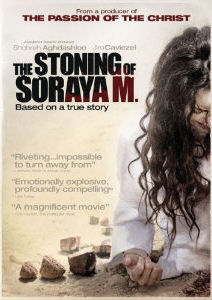 Caroline Friday is a novelist and award winning screenwriter with several film projects in development for both television and theatrical distribution. She is also a 2008 Kairos Screenwriting Winner for spiritually uplifting screenplays, sponsored by the John Templeton Foundation. Caroline currently serves as EVP of Sixth Day Media, LLC, a film finance and production company headquartered in the Atlanta area. She lives in Marietta, Georgia, with her husband and three children and can be found at www.carolinefriday.com. |
The Stoning of Soraya M |
|
Based on the book by French journalist Freidoune Sahebjam (played by Jim Caviezel of The Passion of the Christ, donning another prosthetic nose), the movie opens with Sahebjam’s car breaking down in a remote little village in Iran. As he waits for the local mechanic to make the repairs, he is approached by a beautiful, yet mysterious, village matriarch, Zarah, who tells him about the stoning of her niece, Soraya. At first he is not interested, but when she produces the tip of a mutilated finger, he pulls out his tape recorder and the story begins. From the moment we look into the dark, glistening eyes of Ali, we know there is no hope for Soraya. Diabolical to the core, he makes it clear that he will not rest until she is dead, despite her efforts to cook, clean, and provide a nurturing home for him and their children. The tension builds as we learn there was never a love between the husband and wife. The truth is that he beats and tortures her, and she has retaliated by refusing to comply with his perverted desires. As a result, he has grown tired of her and allowed his eye to wander to fresher, greener pastures. His slow, methodical destruction begins with their two young sons, whom he teaches to hate with a passion. He forces them to hurl insults at Soraya, to threaten to hit her in the face, and to treat her no better than a disobedient dog. It is heartbreaking to watch the oldest son relish in showing such disrespect toward his mother, while the younger son suffers from a guilty conscience. Zarah, who represents the center of good and the voice of reason, uses her influence with the chief religious leader of the |
village, Ebrahim, to defend Soraya. As the gossip mill begins its work, Zarah points a judgmental finger back at Ali, retaliating against his allegations toward her niece. With very little effort, she proves that Soraya is a woman of character and integrity, who has never been unfaithful to her husband. Ali regroups and comes up with another plan: He will force Soraya to work for a recent widower, Mullah, and then build a false case against her. Where Ali is the epitome of terror and evil, Mullah represents the sweet, gentleness of a man who dearly loved his wife. He treats Soraya with the compassion and tenderness that has been denied her all of her life. To all outward appearances, Ali successfully convinces everyone in the village of his wife’s sin, though they privately know he is lying. The nail in the coffin, so to speak, is when he and Ebrahim threaten Mullah and his son and force them to corroborate that Soraya made advances toward Mullah. Having no other recourse, Mullah lies and tenders the fatal blow. Soraya is convicted as an adulterer. I will spare you the gory stoning process. It is horrifying and chilling, yet strangely poetic. Soraya accepts her fate graciously, never once desiring to run away, plead her innocence, or beg for mercy. Zarah fights like a mother protecting her young, but in the end, she is merely a woman and holds no power over the lies concocted by the ruling men who hide behind religion. I was surprised and moved when the older son (who is forced to throw a stone) grieves over his mother, proving he has not become as hard-hearted as his father. Also, it was poetic that a traveling carnival pulls up in its van as the stoning concludes. The ending keeps you on the edge of your seat, as Ali and Ebrahim catch wind that Zarah is revealing all to a Western reporter. My heart went out to the Zarahs of the world, who are willing to risk their own lives to protect innocent women and tell the rest of the world of the horrors inflicted on other Sorayas in the name of God. But this is not the work of the God of Abraham, Isaac, and Jacob, the Father of those who have accepted Jesus Christ. It is the work of Satan, who masquerades as Jehovah God. Do you know the difference? Make sure you do. |








